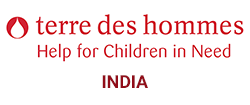The current focal themes of terre des hommes Germany – India Programme “Right To Play” and “Alternative Development Concepts” are designed to bring innovation and energy to achieve child and youth participation.
Tdh- Germany-India Programme recognises the importance of play and recreation as a means of complete development of every child. “Right to Play” is an innovative approach to ensure enjoyment and, more essentially, to promote child and youth participation. This year, tdh Germany – India Programme and its partners conducted “Right to Play” activities in each of its four zones.
East:
- Football training for 72 children and youth. 6 teams formed of which one is a girls’ team.
- 41 children (19 girls & 22 boys) regularly receive rugby coaching through “Khelo Rugby”.
- 5 mixed-group teams formed to play “Ultimate Frisbee”. 205 children and 55 youths received coaching.
- World Play Day celebrated by 1327 children in 7 organizations.
- Play spaces being made available in schools, fields, parks. 60 spaces claimed by children.
- Gender & Play: meetings held with 7 Gram Panchayats to ensure the rights of adolescent girls to play.
- For the first time, girls in remote villages of Dumka stepped out to practice football; after 2 months’ practice they played a tournament.
- 15 girls from Kolkata participated in Pinkathon 2017, asserting girls’ right to play.
North:
- 3983 children (2070 girls and 1913 boys) and 2762 youth (1259 girls and 1503) participated in 11 projects involving play.
- 21 partners facilitated sessions on Right to Play in 157 schools.
- 13 partners have designated one day every week for children to play.
- 13 partners have integrated play in education, health and life skill related activities.
- 6 new playgrounds were accessed in 2 project locations. 75 children play safely on them.
- 250 children and youth from 6 states participated at a zonal level.
- 26 events [15 partners) were held on World Play Day; 2937 children participated.
West:
- 167 play events were organised in which 3719 children and youth participated.
- Children in Ambujwadi, Mumbai (YUVA) accessed play ground after advocacy with local administration.
- Slum children in Pune were trained in football.
- Right to Play event organised in September 2017 in Pune.
South:
- IEC materials on Right to Play developed by HEAL – BMZ circulated to the civil societies and government departments as a part of the observance of the World Play Day.
- Promotion of traditional games focusing on sustainable farming and reducing the vulnerability of girls (Devdasi communities and girls recruited under Sumangali Scheme).
- More than 300 traditional games revived and 53 sports tournaments conducted in the communities.
- World Play Day observed by 4631 children and youth.
Terre des hommes Germany-India Programme’s strategy to advance alternative methods of development to promote a self‐determined life, especially of children and young people in harmony with nature, saw considerable action and progress during 2017-18. Working around the concepts of “Good Living”, “Diversity as Development Principle”, and “Radical ecological democracy”, the organization and its partners strengthened individuals and communities to develop their living environment locally without destroying the natural and social resources.
East:
- A database of traditional food from the local eco-system was created in Odisha, where 22 ground-level volunteers work to replace market food by local ecosystem food to address malnutrition.
- 384 women have been trained on producing edible products out of the local forest produce
North:
- 70 bio-gas and 84 compost pits installed in UP and Uttarakhand.
- 40 solar lamps distributed in UP and 80 solar cookers in Uttarakhand.
- 3 Watermill upgradations facilitated.
- Introduction of small rural technology by HESCO.
- In UP and Uttarakhand, 707 farmers were trained on sustainable agriculture. 36 farmers with vermi-compost have been trained in mushroom cropping.
- 130 farmers have been trained in food processing and planting kitchen gardens.
- 1240 kitchen gardens have been facilitated in UP and Rajasthan.
- 38 gabions, 563 infiltration trenches, 10 infiltrations ponds, 1 percolation pond and 34 roof water tanks have been supported.
West:
- 384 farmers have adopted SRI (System of Rice Intensification) method in Chhattisgarh.
- 1715 families have taken up organic farming and other natural resource management.
- Around 90 acres of dry land brought under irrigation through sustainable rain water harvesting methods.
South:
- 35 farmers trained on sustainable farming methods by youth team members in Kanyakumari.
- Sustainable waste management initiated in 12 villages in coastal region of Kanyakumari.
- Children rescued from the mining region ensure food security by growing their own food in rehabilitation centre kitchen garden. Around 250 households in the mining affected region get Rs. 350 worth of vegetables every month.

